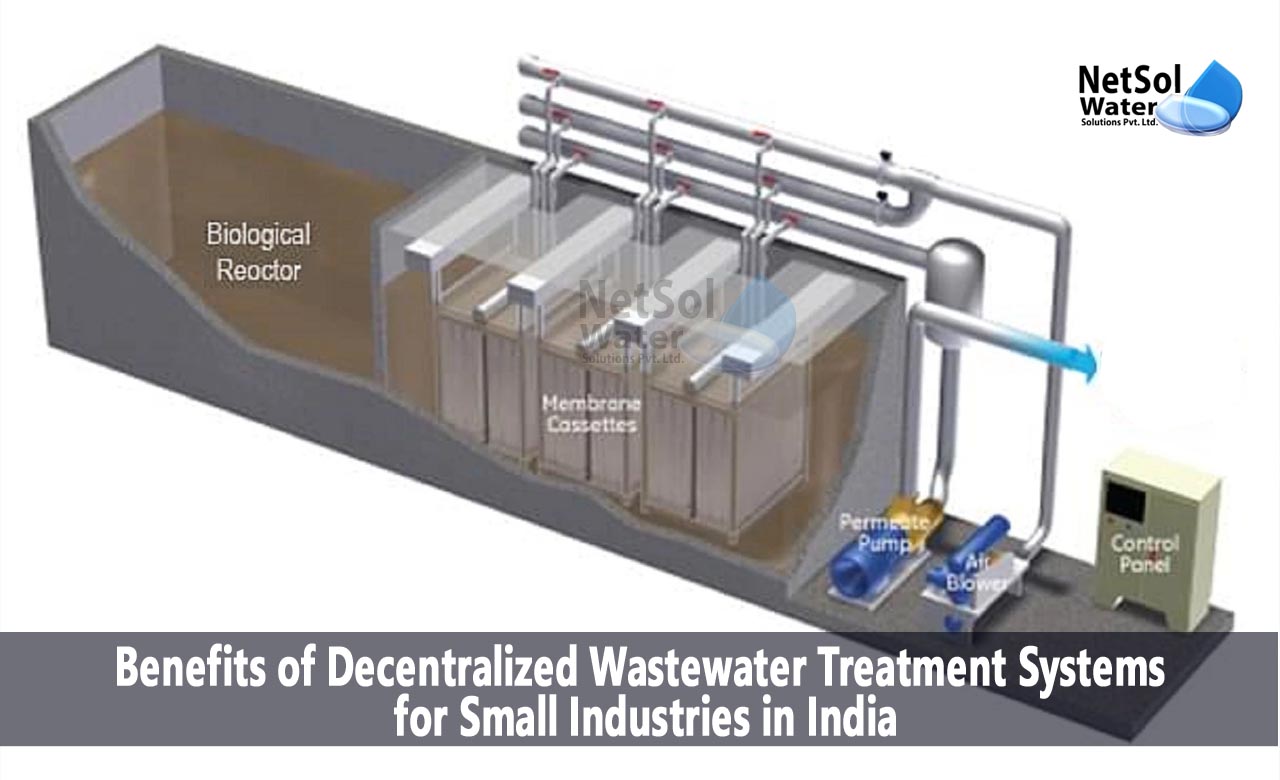Benefits of Decentralized WWT Systems for Small Industries in India
An essential component of environmental stewardship is wastewater treatment, which is especially important for India's small businesses. Effective wastewater management is a challenge for small-scale businesses as they expand. For these businesses, decentralised wastewater treatment systems provide an affordable and long-term option. The advantages of decentralised wastewater treatment systems for small industries in India will be discussed in this blog.
· Cost-Effective Solutions
Small businesses can have tight budgets and lack the funding necessary to build expansive wastewater treatment facilities. Decentralised systems have lower initial capital requirements and are therefore more economical. They provide a customised solution that small businesses may afford since they are modular and can be adjusted to meet the unique requirements of each industry.
· Decreased Need for Infrastructure
Decentralised systems do not require the creation of large-scale infrastructure, such as extensive sewer networks, as centralised treatment plants do. They are therefore appropriate for small businesses situated in underdeveloped areas. By avoiding the need to invest in substantial pipeline networks and huge treatment facilities, small firms can save a lot of money.
· Scalability
Production levels in India's small enterprises frequently fluctuate. Because decentralised systems are scalable, they can readily adjust to wastewater volumes that rise or fall. As companies grow, they can easily and affordably increase their treatment capacity without having to completely redesign their entire system.
· Efficiency in Space
Compared to conventional centralised treatment facilities, decentralised wastewater treatment systems are intended to take up less space. Even in places where there is a shortage of land, small companies can build these systems to maximise their property's use and lessen their influence on nearby ecosystems.
· Enhanced Environmental Compliance
Adherence to environmental rules is crucial across all sectors. Small businesses can comply with the necessary effluent quality requirements by using decentralised systems that are engineered to meet or beyond local and national standards. Thus, there is less chance of non-compliance and the related legal and reputational ramifications.
· Recovering Resources
Wastewater from small industries can be treated by decentralised systems to recover important materials. This includes the possibility of producing energy through anaerobic digestion, reusing treated water for purposes other than drinking, and recovering valuable materials from wastewater, all of which lower operating costs and have a less negative effect on the environment.
· Localized Treatment
Wastewater is treated closer to the source by decentralised systems, which shortens the distance it has to travel to a centralised facility. This reduces the possibility of unintentional leaks during transit while also lowering the energy consumption related to transportation. Small businesses that cannot afford the logistical challenges of long-distance wastewater transfer benefit most from localised treatment.
· Self-reliance
More control over wastewater management is available to small enterprises with decentralised wastewater treatment systems. They rely less on outside treatment providers, which is advantageous in places where centralised facilities might not be accessible or dependable. Because of their independence, they may operate more effectively and adjust to the demands of a particular industry.
· Reduced Energy Consumption
Energy efficiency can be taken into consideration while designing decentralised systems. Small enterprises have the potential to lower their energy consumption for wastewater treatment through the utilisation of innovative technology and renewable energy sources. This promotes sustainability by lowering operating expenses and leaving a less environmental impact.
· Stakeholder and Community Relations
For small businesses, using decentralised wastewater treatment systems can enhance stakeholder and community connections. These solutions frequently result in less of an adverse effect on the environment, less smells, and quieter operations, which improves the neighbourliness of enterprises. Having good community connections can be crucial to getting approval from the local government and licences for industrial operations.
Conclusion:
Decentralised wastewater treatment systems have a number of advantages that might assist small enterprises in India in successfully addressing the problems associated with wastewater management. These systems improve environmental compliance, lower the need for infrastructure, and offer affordable alternatives. They also encourage resource recovery and are scalable and space-efficient. Decentralised systems also provide stronger community and stakeholder interactions, increased independence, and lower energy use. Small businesses can support India's general environmental health as well as their personal financial success by adopting decentralised wastewater treatment.
Netsol Water is Greater Noida-based leading water & wastewater treatment plant manufacturer. We are industry's most demanding company based on client review and work quality. We are known as best commercial RO plant manufacturers, industrial RO plant manufacturer, sewage treatment plant manufacturer, Water Softener Plant Manufacturers and effluent treatment plant manufacturers. Apart from this 24x7 customer support is our USP. Call on +91-9650608473, or write us at enquiry@netsolwater.com for any support, inquiry or product-purchase related query.



